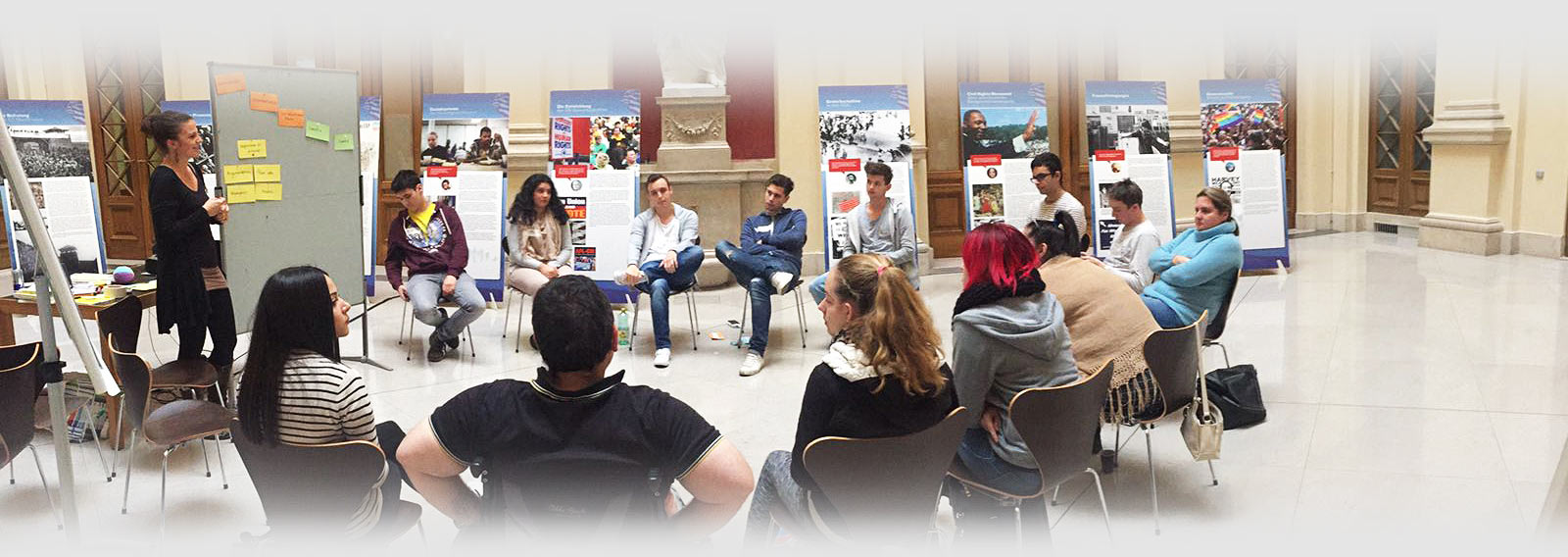End of the dream?
Motive and aims of the project
In August 1963, Martin Luther King delivered his most famous speech to over 250,000 people in Washington. He spoke about his dream of a world in which all people – regardless of skin colour or religion – would have the same rights. Martin Luther King was murdered on 4th April 1968 in Memphis.
On 15th January 2014 Martin Luther King – one of the most famous personalities in the American civil rights movement – would have celebrated his 85th birthday. His vision for the civil rights movement of non-violent protest through civil disobedience and other forms of peaceful protest aimed to challenge and put an end to the politics of segregation. Despite his achievements, racism and social inequality through the law and the use of the law couldn't be eradicated.
Fifty years after the civil rights movement and more than 140 years after the abolition of slavery racial discrimination continues, despite anti-discrimination legislation. Despite the successes of the American civil rights movement, it is still not possible to talk about true equality.
The project "Ausgeträumt?" (End of the Dream?) uses this as a starting point for workshops aimed at young people that introduce the work of Martin Luther King and the American civil rights movement, as well as the "Black Power" movement which also grew out of it. The development, the demands, the successes and setbacks, as well as the various approaches of the civil rights movement are comprehensively covered, from slavery right up to the current situation.
Opening
The project started on 15th January 2014 with a public opening. During the opening, Willi Mernyi (Chair of the Austrian Mauthausen Committee) and Marlene Nice (Cultural Attaché of the US Embassy) used their opening speeches to speak directly to young people in the audience. Around 60 people – the majority of whom where school pupils – attended the opening. To introduce some of the topics in the comings workshop, the film "The Black Power Mixtape 1967-1975" was shown as part of the opening.
Workshops
The workshops will introduce the young people to the life and works of Martin Luther King. The history of the civil rights movement in the US around Martin Luther King and the "Black Power" movement which would eventually develop out of it are discussed in terms of their development, demands, successes and setbacks by asking the following questions:
- Who were the activists and artists who took part?
- What form did resistance take?
- Did violence play a part in the activities of the civil rights movement?
- How were music, film and language used in the different areas of the African American civil rights movement?
Starting with the history of slavery and working through the African American civil rights movement the workshops continue the story into the present day. The engagement one man led to improvements in the situation of many. What can be learnt from this person's story and how can we use it in our own lives?
Which strategies used by the civil rights movement can be used today? And, in what areas might they be used?
In tying the events to the present day, young people are encouraged in the course of the workshops to work on their own ideas and concepts of togetherness. The topics and themes are wide-ranging and relate in some examples to the school system, LGBTQ rights, migration, animal rights, and much more.
The workshops are carried out by guides trained by the Austrian Mauthausen Committee. The workshops last roughly four hours and are offered in both German and English in the two weeks following the birthday of Dr. King, from 15th-29th January 2014. In this period a total of twenty workshops will be carried out.
Their was a high demand fir the workshops very quickly all available slots were booked. The feedback was overwhelmingly positive and garnered comments such as:
"I took part in the workshop with my Berufsschule class and I enjoyed it a lot. The lecture was tailored to our class and what we knew already. The way the workshop was broken up into smaller sections and the varied activities kept everybody interested. I found it to be a very interesting excursion and I learnt a lot. Please let me know if you develop any new workshops." (Andrea Kaltenböck)
"Thank you for the excellent support and the interesting workshop. We are looking forward to seeing the video clips!" (Eva Annau)
"I wanted to thank you again for the truly life-enhancing workshops! We were all – my class and myself – really impressed. After speaking to my pupils about their experience I got the following feedback:
- The opening overview of the events could have been somewhat shorter as the persons and facts were largely already known to me and I didn't learn much new (this comment was from a particularly engaged and well-read Year 7 and certainly doesn't apply to the group as a whole!)
- The way the workshop alternated between games, talks and presentations was good. Our workshop leader Ronny was friendly and very competent. Thanks again!
- Having English as the workshop language was considered a refreshing change and didn't lead to any problems.
- The pupils were particularly impressed by the amount of patience and dedication it must require to keep to the principle of non-violent resistance.
We would definitely come back and we can't wait to see our video clip!" (Maria Haas)
"The feedback from the pupils has been really good, everybody really enjoyed participating in the workshop. Keep up the good work!" (Veronkia Adamcik)
The success of the project was possible due to the work of many organisations and people, without whose support with content, financial and organisational matters the project would not have been possible. Our particular thanks go to





